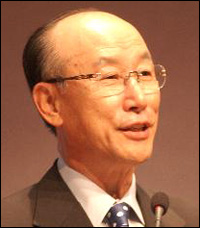Full Gospel Church mired in corruption
The son of the founder of the largest church in Korea was summoned Monday by the prosecution for questioning on suspicions of embezzling funds from an affiliated company.
His mother is also suspected of having used church money in a real estate deal.
These are only two of many allegations surrounding Yoido Full Gospel Church and the family of its founder Pastor Cho Yong-gi.
Members of Cho’s family have been suspected of misusing church funds and committing other irregularities after dominating church decision-making bodies. They have also come under fire from civic and religious groups calling for reform of the nation’s Christian community. They have also been confronted by the labor union of the Kukmin Ilbo that claims family members have used the Christian-based newspaper as a means to exert influence.
Though suspicions have surrounded pastor Cho and his family for years, authorities only began investigating them last September when a group of 28 elders filed a complaint with the prosecution against pastor Cho for breach of trust and allegations of embezzlement.
Pastor Kim Kyung-jik, head of the Christian Citizen’s Union who supported the elders, said in a press briefing at that time, “We were shocked that pastor Cho has taken an astronomical amount of money from the church. We have collected information about his corrupt dealings.”
He said Cho received 64 billion won ($55 million) from the church for five years around the time of his retirement in May 2008, including a 20 billion won retirement fund. Kim called for the pastor to explain what he used the money for.
The elders also claimed Cho diverted over 20 billion won in church funds to his eldest son Hee-jun for stock investments.
After the allegations were lodged last September, prosecutors questioned the complainants. But they haven’t questioned Cho in the seven months since.
Regarding the investigation, a church official said, “The complaint was filed not by the church’s official group of elders but by individual elders. We make no official comment on the issue.”
The pastor’s second son, Min-je, chairman of the Kukmin Ilbo, was questioned Monday for allegedly misappropriating about 9 million won in funds from affiliate company Digiwave, an audio system provider for mega churches. He also faces allegations that he used 130 million won of government subsidies for the newspaper for personal purposes.
He has also been on trial since last November for causing a 4.5-billion won loss to a waste management company he had taken over.
Pastor Cho’s wife, Kim Sung-hae, president of Hansei University founded by the church, is suspected of having paid for the construction of a building in the school with donations from the congregation in 1998 and selling it to the school at an inflated price.
She also allegedly kept 2.8 million won of monthly rent paid by the building’s tenants that should have gone to the school.
The Kukmin Ilbo’s union filed a complaint against her for embezzlement in April last year, but the prosecution cleared her of the accusation, citing lack of evidence.
According to the union, another complaint was filed against her in February by the same group of elders that brought allegations against her husband. They claimed Kim misused 10 billion won, part of a budget allocated to build a library, and smuggled out foreign currency through Bethesda University of California, also founded by the church.
 |
The alleged irregularities by the pastor’s family, especially by the second son, have led to collective action by the union.
Last September, the union demanded that Pastor Cho, who was chairman of the paper, and his son Min-je, who was president, resign. It claimed the junior Cho was too corrupt to run a newspaper and that the Cho family has used the daily for personal purposes.
But Cho junior fired the leader of the union, which then launched a strike in December.
“For the last 23 years in the newspaper’s history, 85 percent of the paper’s chiefs have been members from this family. The family also dominated decision-making and didn’t follow due procedures to pursue personnel affairs ― an act damaging fair reporting and the independence of our editorial rights,” a union member said.
During the walkout, it was found that the president had American citizenship ― a violation of the Law on Newspapers that bans organizations with non-Korean heads from publishing newspapers.
Then the Kukmin Cultural Foundation, the newspaper’s single shareholder, appointed a new president and promoted Cho junior to chairman in March, taking advantage of a loophole in the law. Senior Cho became honorary chairman.

<Korea Times/Kim Rahn>

























































